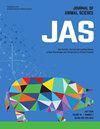绿茶提取物复合物作为植物性补充物降低断奶仔猪胆盐水解酶活性,提高生长性能。
IF 2.9
2区 农林科学
Q1 AGRICULTURE, DAIRY & ANIMAL SCIENCE
引用次数: 0
摘要
断奶后由于环境和日粮的变化,猪的压力很大。这个阶段腹泻的发生率很高。抗生素和氧化锌(ZnO)等生长促进剂不仅可以减少断奶后腹泻,还可以提高断奶仔猪的生长性能。研究还表明,猪的生长性能与肠道胆盐水解酶(BSH)呈负相关。抗生素生长促进剂(AGP)和氧化锌已被证明能有效抑制BSH,这与猪的生长性能提高有关。因此,本研究评估了植物性补充剂绿茶提取物、丁酸和维生素K (GBK)对断奶仔猪生长性能、营养物质消化率、粪便评分、血液特征和肠道微生物群BSH活性的影响。选取192头21日龄的杂交断奶猪[(约克郡×长白)×杜洛克]进行了为期四周的饲养试验。试验猪分为6个处理,每个处理32头,每个处理8个猪圈。饲喂后,平均日增重(ADG)和料重比(G:F)随GBK添加量的增加呈线性提高。饲喂期内,各处理组均未出现腹泻,断奶仔猪粪便评分不受影响。饲粮添加对断奶仔猪的白细胞计数、红细胞计数、淋巴细胞百分比和血尿素氮等血液参数均无负面影响。此外,添加GBK可降低TNF-α和IL-6,增加免疫球蛋白(IgA、IgG)。此外,GBK降低了具有BSH活性的肠道微生物群的丰度,包括严格感梭菌6、vadinBB60组、Marvinbryantia、Muribaculaceae和Enterococcus。相关分析显示,与二次胆汁酸生物合成相关的肠道菌群功能与猪的ADG、ADFI和G:F比呈较强的负相关。绿茶、丁酸和维生素K组合可有效替代AGP和ZnO,提高断奶仔猪的生长性能、饲料效率和腹泻评分。此外,这种喂养策略对肠道微生物组有调节作用,改变与断奶仔猪生长性能改善相关的BSH活性。本文章由计算机程序翻译,如有差异,请以英文原文为准。
Green tea extract complex as a phytogenic supplement to reduce bile salt hydrolase activity and enhance growth performance in weaning pigs.
The post-weaning period is stressful for pigs due to changes in their environment and diet. The occurrence of diarrhea at this stage is high. Growth promoters such as antibiotics and zinc oxide (ZnO) have been used to not only reduce post-weaning diarrhea but also improve growth performance of weaning pigs. It has also been shown that the growth performance of pigs is negatively associated with bile salt hydrolase (BSH) in the gut. Antibiotic growth promoters (AGP) and ZnO administration have demonstrated effective inhibition of BSH, which is linked to enhanced growth performance in pigs. Therefore, this study evaluated the effects of a plant-based supplement, green tea extract, with butyric acid, and vitamin K (GBK), on growth performance, nutrient digestibility, fecal score, blood profile, and BSH activity of the gut microbiota of weaning pigs. Here, 192 crossbred weaning pigs [(Yorkshire × Landrace) × Duroc], aged 21 days, were subjected to a four-week-long feeding experiment. Pigs were divided into six treatments (n = 32 per treatment, 8 pens per treatment). After feeding, the average daily gain (ADG) and gain-to-feed (G:F) ratio improved linearly with GBK supplementation. During the feeding period, diarrhea was not observed in the treatment groups, and the fecal scores of the weaned pigs were not affected. Supplementation had no negative impact on the blood profile parameters of weaned pigs, including white blood cell count, red blood cell count, lymphocyte percentage, and blood urea nitrogen. Moreover, supplementation of GBK decreased the TNF-α and IL-6 while immunoglobulins (IgA, IgG) increased. In addition, GBK reduced the abundance of gut microbiota with BSH activity, including Clostridium sensu stricto 6, the Clostridia vadinBB60 group, Marvinbryantia, Muribaculaceae, and Enterococcus. Correlation analysis revealed that gut microbiota function related to secondary bile acid biosynthesis had a strong negative correlation with ADG, ADFI, and G:F ratio of the pigs. The combination of green tea, butyric acid, and vitamin K is an effective alternative to AGP and ZnO for improving growth performance, feed efficiency, and diarrhea score of weaned pigs. In addition, this feeding strategy had a modulatory effect on the gut microbiome, altering BSH activity associated with improved growth performance in weaning pigs.
求助全文
通过发布文献求助,成功后即可免费获取论文全文。
去求助
来源期刊

Journal of animal science
农林科学-奶制品与动物科学
CiteScore
4.80
自引率
12.10%
发文量
1589
审稿时长
3 months
期刊介绍:
The Journal of Animal Science (JAS) is the premier journal for animal science and serves as the leading source of new knowledge and perspective in this area. JAS publishes more than 500 fully reviewed research articles, invited reviews, technical notes, and letters to the editor each year.
Articles published in JAS encompass a broad range of research topics in animal production and fundamental aspects of genetics, nutrition, physiology, and preparation and utilization of animal products. Articles typically report research with beef cattle, companion animals, goats, horses, pigs, and sheep; however, studies involving other farm animals, aquatic and wildlife species, and laboratory animal species that address fundamental questions related to livestock and companion animal biology will be considered for publication.
 求助内容:
求助内容: 应助结果提醒方式:
应助结果提醒方式:


